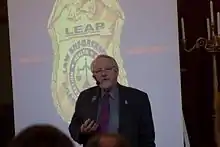Jack A. Cole
Jack A. Cole (born October 9, 1938) is a retired Detective Lieutenant who worked for the New Jersey State Police for 26 years. For twelve of those years, he worked as an undercover narcotics officer. Cole is executive director of Law Enforcement Against Prohibition (LEAP), an organization comprising former and current police officers, government agents and other law enforcement agents who oppose the current War on Drugs.

Jack Cole speaks internationally for LEAP, and has written several articles about drug-policy reform. Cole holds a degree in Criminal Justice and a master's degree in Public Policy from the University of Massachusetts. He believes race and gender bias by police, police brutality, and corruption in law enforcement can begin to be solved by ending drug prohibition.
Cole has taught courses to police recruits and veteran officers on ethics, integrity, moral decision-making, and the detrimental effects of racial profiling. Jack Cole and his wife reside in Boston, Massachusetts.[1][2][3][4][5][6][7]
Early life and education
Cole attended Wichita High School East and received a masters from University of Massachusetts Boston.
References
- Smith, Phillip (August 21, 2002). "Jack Cole Interview" (PDF). DRCNet.
- "Cops Say Legalize Drugs: Former Enforcers Tour Rhode Island Calling for an End to Drug Prohibition". Students for Sensible Drug Policy. November 7, 2003.
- Topping, Alexandra (September 11, 2007). "Badge of honour: From undercover US drugs cop to anti-prohibitionist? More and more people are asking Jack Cole how that transformation came about". The Guardian.
- "Drug war takes a flying LEAP". Los Angeles Times. September 21, 2007.
- "Christians Against Prohibition: Part 1 Jack Cole at Cannabis Colloquium". Thinking CAP. February 1, 2012.
- "The Angel Clark Show with Co-Founder of (LEAP) Jack Cole: The TRUTH About Drug Prohibition". RadioFreedom.us. February 5, 2013.
- Cole, Jack A. (August 24, 2014). "End the prohibition of heroin: A cop's experience tells him the drug war is doing more harm than good". The Boston Globe.